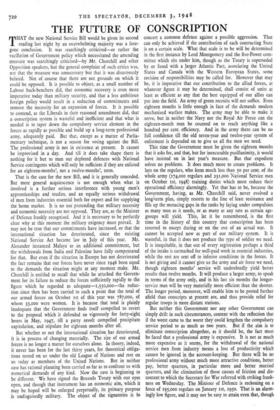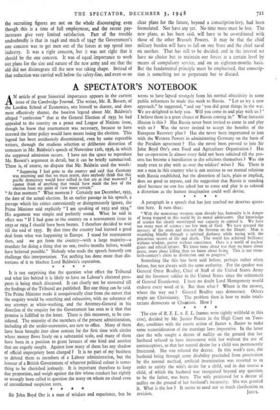THE FUTURE OF CONSCRIPTION
THAT the new National Service Bill would be given its second reading last night by an overwhelming majority was a fore- gone conclusion. It was searchingly criticised—or rather the vacillation of Goxernment policy which necessitated the amending Measure was searchingly criticised—by Mr. Churchill and other Opposition speakers, but the general complaint of such critics 'was, not that the measure was unnecessary but that it was disastrously belated. Not of course that there are not grounds on which it could be opposed. It is possible to object, as a small number of Labour back-benchers did, that economic recovery is even more imperative today than military security, and that a less ambitious foreign policy would result in a reduction of commitments and remove the necessity for an expansion of forces. It is possible to contend, as the Liberals in their reasoned amendment did, that a conscription system is wasteful and inefficient and that what is needed is to taper down the compulsory service element in the forces as rapidly as possible and build up a long-term professional army, adequately paid. But that, except as a matter of Parlia- mentary technique, is not a reason for voting against the Bill. The professional army is not in existence at present. It cannot be improvised in a day. And till it does take shape there is nothing for it but to man our depleted defences with National Service contingents which will only be sufficient if they are enlisted for an eighteen-months', not a twelve-months', term.
That is the case for the new Bill, and it is generally conceded. But mere general acquiescence is not enough when what is involved is a further serious interference with young men's apprenticeships and studies, and an equally serious withdrawal of men from industries essential both for export and for supplying the home market. It is no use .pretending that military necessity and economic necessity are not opposed. They are, as the Minister of Defence frankly recognised. And it is necessary to be perfectly clear why at this moment the military exigency must prevail. It may not be true that our commitments have increased, or that the international situation has deteriorated, since the existing National Service Act became law in July of this year. Mr. Alexander instanced Malaya • as an additional commitment, but the withdrawals from India and Palestine have fully compensated for that. But even if the situation in Europe has not deteriorated the fact remains that our forces have never since 1946 been equal to the demands the situation might at any moment make. Mr. Churchill is entitled to recall that while he attacked the Govern- ment for its failure to reduce the forces sufficiently rapidly to the figure which he regarded as adequate—t,55o,000—the reduc- tion since then has been carried to such a point that the total of our armed forces on October 1st of this year was 787,000, of whom 35,000 were women. It is because that total is plainly inadequate that the Government finds itself compelled to revert to the proposal which it defended -so vigorously for forty-eight hours in May, 1947, till a party revolt compelled precipitate capitulation, and stipulate for eighteen months after all.
But whether or not the international situation has deteriorated, it is in process of changing materially. The size of our armed forces is no longer a matter for ourselves alone. In theory, indeed, it never has been for the last thirty years, for theoretical obliga- tions rested on us under the old League of Nations and rest on us today as members of the United Nations. But in neither case has rational planning been carried so far as to confront us with numerical demands of any kind. Now the case is beginning to be different.' We have signed the Brussels Treaty with our eyes open, and though that instrument has an economic aim, which it may be hoped will be enlarged perpetually, its primary purpose is undisguisedly military. The object of the signatories is to concert a common defence against a possible aggression. That can only be achieved if the contribution of each contracting State is on a certain scale. What that scale is to be will be determined in the first instance by Lord Montgomery and the five-Power com- mittee which sits under him, though as the Treaty is superseded by or fused with a larger Atlantic Pact, associating the United States and Canada with the Western European States, some revision of responsibilities may be called for. However that may be, it is imperative that- our contribution to the allied forces, at whatever figure it may be determined, shall consist of units at least as efficient as any that the best equipped of our allies can put into the field. An army of green recruits will not suffice. Even eighteen months is little enough in face of the demands modern mechanised warfare makes. The army may be able to make it serve, but in neither the Navy nor the Royal Air Force can the eighteen-month man be counted on to reach anything like a hundred per cent. efficiency. And in the army there can be no full confidence till the old seven-year and twelve-year system of enlistment is depended on to give us all the men we need.
This time the Government must be given the eighteen months that it asks for, and that, but for inexcusable pusillanimity, it would have insisted on in last year's measure. But that expedient solves no problems. It does much more to create problems. It lays on the regulars, who form much less than 50 per cent. of the whole army (174,000 regulars and 231,000 -National Service men on October 1st, 1948) training duties which must reduce their operational efficiency alarmingly. Yet that has to be, because the Government, having, as Mr. Churchill said, never evolved a longs-term plan, simply resorts to the line of least resistance and fills up the menacing gaps in the ranks by laying under compulsion as many men as it needs, or as many at any rate as certain age- groups will yield. This, let it be remembered, is the first time in the history of this country that conscription has been resorted to except during or on the eve of an actual war. It cannot be accepted now as part of our military system. It is wasteful, in that it does not produce the type of soldier we need. It is inequitable, in that out of every registration perhaps a third of the intake is earmarked for well-paid work in essential industries, while the rest are sent off to inferior conditions in the forces. It is not giving and it cannot'give us the army and air force we need, though eighteen months' service will undoubtedly yield better results than twelve months. It will produce a larger army, to speak in terms of the army only, and in his last six months the longer- service man will be very materially more efficient than the shorter. The longer period, Moreover, will enable him to be posted further afield than conscripts at present are, and thus provide relief for regular troops in more distant stations.
But neither this Government nor any other Government can simply drift in such circumstances, content with the reflection that if the worst came to the worst they could lengthen the compulsory service period to as much as two years. But if the aim is to eliminate conscription altogether, as it should be, the fact must be faced that a professional army is expensive. It is not as much more expensive as it seems„ for the withdrawal of the national service men from industry means a loss of productivity which cannot be ignored in the account-keeping. But there will be no professional army without much more attractive conditions, better pay, better quarters, in particular more and better married quarters, and the elimination of those causes of friction and dis- content to which the Secretary for War referred with striking frank- ness on Wednesday. The Minister of Defence is reckoning on a force of 195,000 regulars on January 1st, 1950. That is an alarm- ingly low figure, and it may not be easy to attain even that, though the recruiting figures are not on the whole discouraging even though this is a time of full employment, and the recent pay- increases give very limited satisfaction. Part of the trouble undoubtedly is that in 1946 and much of 1947 the Government's one concern was to get men out of the forces at top speed into industry. It was a right concern, but it was not right that it should be the one concern. It was of equal importance to work out plans for the size and nature of the new army and see that the old did not disintegrate till the new was taking shape. Instead of that reduction was carried well below the safety-line, and even so no clear plans for the future, beyond a conscription-levy, had been formulated. Nor have any yet. No time more must be lost. The new plans, as has been said, will have to be co-ordinated with those of the other Brussels Powers. It may be that the chief military burden will have to fall on one State and the chief naval on another. That has still to be decided, and in the interval we have rio choice but to maintain our forces at a certain level by means of compulsory service, and on an eighteen-months basis. But the fundamental principle must be emphasised, that conscrip- tion is something not to perpetuate but to discard.



































 Previous page
Previous page